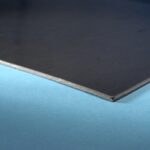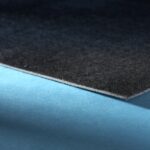About
DENSBAK Automotive heavy layers
Niko’s standard DENSBAK F40 automotive heavy layer is the preferred choice for Tier 1 automotive companies in the UK.
Our automotive heavy layers are designed to accommodate a wide range of processing conditions. Niko automotive heavy mass layers can be combined and supplied with a wide range of substrates (for example, films, barrier layers, non-wovens, TPOs, pressure sensitive adhesives and hotmelts) to form multi-layer composites in hot or cold tool moulding processes.
Growing environmental requirements have seen a trend towards lighter weight mass layers. Niko heavy layer solutions have been at the heart of this change with DENSBAK products suitable for thermoforming starting at just 1000gms/m2. Yet even at these low weights DENSBAK Automotive heavy layers can still provide the same key performance features of thermal stability coupled with low odour, low VOC, and low fogging benefits.
Through Niko’s production and process technology, which utilises its proprietary DENSBAK formulations, Niko can provide our customers with opportunities for blank size reductions and significantly improve process foam curing and moulding cycle times.
We have also developed new automotive heavy layer formulations with higher filler acceptance levels, whilst still maintaining the same key performance characteristics.
What is DENSBAK F40 Range?
Our automotive heavy layer is a thermoplastic elastomeric material, which is composed of a blend of polymers compounded with mineral fillers. It is designed to possess high elongation at elevated temperatures and is particularly suitable for thermoforming. DENSBAK F40 range is available in a variety of weights and has surface treatments as an adhesion promoter.
DENSBAK F40 can be supplied with a wide range of substrates to form multi-layer composites in hot or cold tool moulding processes.
Key features & benefits
Niko ‘lightweight’ mass layer solutions start at just 1000gms/m2 up to 15,000gms/m2. As raw materials (particularly fillers) have different densities, we sell our heavy mass layers by weight (kg/m2) as opposed to thickness. This means we produce and control our manufacturing process according to unit mass, measured in kg/m2 or lbs/ft2.
One of the most significant key features of DENSBAK automotive heavy layers are their ability to offer high elongation at elevated temperatures, which means they thermally stable. Unlike some alternative heavy layers, DENSBAK guarantees low shrinkage. Effectively this means Niko products can create opportunities for our automotive customers to achieve cost savings through sheet size reductions (5% - 25% reductions in blank sizes).
All three Niko production lines allow a 2000mm wide finished roll or sheet width. Die cutting options are also available, which can result in process savings and lower transport costs for our customers. This also means Niko can provide pre-consumer recycling opportunities of skeletal waste and reduces its environmental footprint.
Some alternative heavy layer products can have problems with process oils migrating to the surface (know as 'bloom') which can give rise to problems with lamination. However, DENSBAK is designed to be free from surface oils, thereby migrating these issues. As standard, the surface of all our Automotive heavy layers is treated to increase the surface energy of the product, which aids its adhesion to other materials.
DENSBAK plain products are supplied with a linen embossed finish to either one side or both sides. This surface of DENSBAK is ideally suited to back foaming applications due the increased surface area. This means DENSBAK can improve process cycle times during foam curing and moulding applications. The surface finish also helps to prevent static build-ups and help to prevent sheet blocking.
DENSBAK is engineered to be a low VOC heavy layer. Niko material has Nissan and JLR external accreditation according to NES M0402, STJLR.51.5229, VDA277 and VDA278.
Yes, DENSBAK heavy layers can contain up to 80% in weight in pre or post-consumer recycled material and continue to perform as if they were produced from prime materials.
DENSBAK automotive heavy layers are already approved by many OEM manufactures including: -
JLR, Toyota, Ford, BMW, Nissan, Volkswagen, Aston Martin, Mclaren
- Inner dashes
- Interior Main Floor Carpets
- Floor insulators
- Wheel arch insulators
- Inner trunk floor insulators.




